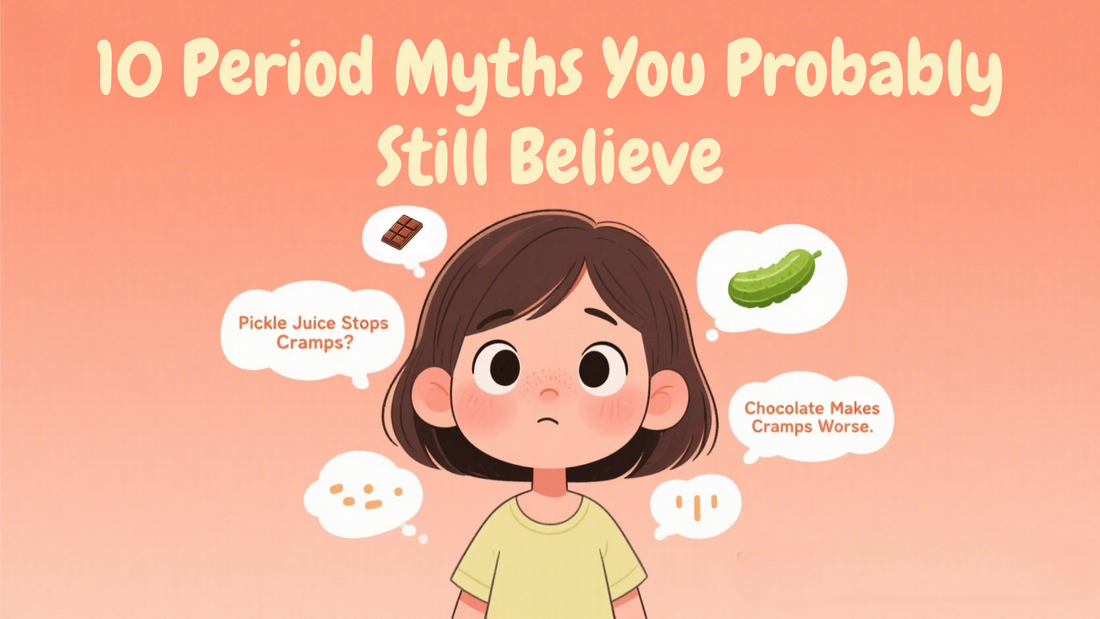
10 Common Period Myths You Might Still Believe And What’s Actually True
Share
Busting the Most Common Myths About Your Menstrual Cycle
If you've ever exchanged period stories with friends, scrolled through TikTok advice, or Googled cramps, you've likely been exposed to some dodgy "facts" about periods. Some of them have been circulating for decades and can influence how we treat our bodies, usually in unhelpful ways. Let's bust 10 period myths, have a chat about what science says, and give you tips on how you can naturally support your cycle with good choices and a little assistance from PumPums Menstrual Relief Gummies.

Does Menstrual Blood Contain Toxins?
One of the most popular myths is that menstrual blood is "dirty" or has toxins inside it that the body needs to eliminate. In reality, menstrual blood is just a combination of blood, uterine lining tissue, and vaginal secretions. It's not poisonous. The Mayo Clinic states that your period is just a natural process in your reproductive system and is not a "detox." Your liver and kidneys are detoxing already on your behalf, so don't worry about toxic substances being released during menstruation.
Can You Get Pregnant If You Have Unprotected Sex During Your Period, Or Is That Impossible?
Yes, it is possible—though the odds are not quite as kind. If you have a shorter cycle, ovulation may happen shortly after bleeding stops, and sperm can last up to five days in the reproductive tract (American College of Obstetricians and Gynecologists). So if you are sexually active, use protection even during your period. You may find yourself assuming you're "safe" and accidents will not happen, but they can.
Is It True That Period Pain Is Just Something You Have To Put Up With Forever?
Not at all. Premenstrual Syndrome (PMS) is a real condition that occurs in approximately 90% of menstruating women at some point or another (American College of Obstetricians and Gynecologists). Symptoms such as bloating, mood changes, cramps, and fatigue have a physiologic cause—changes in estrogen and progesterone can affect brain chemistry, water retention, and inflammation. Promoting hydration and electrolyte equilibrium, such as with PumPums Menstrual Relief Gummies with pickle juice and ACV, may soothe bloating and cramps.
Should You Avoid Exercise During Your Period?
Actually, it's a good idea to get moving. Harvard Health observes that light to moderate exercise will bring more blood flow, cause endorphins to increase, and cut down on cramps. Take a walk, attempt yoga, or attempt gentle strength training, and feel a little better. If too much exercise is annoying to you, heed your body's warning and modify your routine—there's no medical reason not to avoid activity altogether unless you're sick.

Do You Lose a Lot of Blood During Your Period?
It may seem like a lot, but the typical menstrual blood loss is only 30–40 milliliters—2–3 tablespoons—per cycle (Mayo Clinic). Heavy menstrual bleeding means losing greater than 80 milliliters, bleeding through pads or tampons hourly for multiple hours, or passing large clots. If that's occurring, check in with a healthcare provider to eliminate conditions such as fibroids or hormonal imbalances.
Can Pickle Juice Actually Help Menstrual Cramps?
Yes! Pickle juice has electrolytes such as sodium, which can quite possibly relieve muscle cramps by enhancing nerve impulses and fluid levels. While research is ongoing, some sports medicine studies indicate that pickle juice may prevent exercise-induced cramps in mere minutes. The same principle can be applied to menstrual cramps, as well. Learn more about the science behind the phenomenon in this PumPums blog post. PumPums Menstrual Relief Gummies contain a unique Pickle+ formula, ACV, and cucumber extract to bring hydration support together with natural relief.
Should You Avoid Swimming Or Taking Baths During Your Period?
Not at all. Swimming is safe during menstruation as long as you’re using proper period protection like a tampon, menstrual cup, or disc. The CDC notes that chlorinated pool water is not a health risk, and being in water can sometimes even ease cramps. The idea that sharks are drawn to menstrual blood is also a myth—shark attack data of the Florida Museum shows no evidence linking attacks to menstruating swimmers.

Do Periods Sync When You Spend Time Together?
The "menstrual synchrony" hypothesis was popularized after a 1971 experiment implied that women who live in close quarters synchronize their periods. But recent research, including a big study published in the journal Nature, was unable to detect any systematic evidence that cycles did sync up. Like, timing is sheer coincidence because of variations in cycle length.
Should You Skip Dairy to Reduce Cramps?
This varies for each person. Some women experience less bloating when they cut back on dairy foods in the days before and during their period, but there is no general rule. Harvard Health suggests that calcium from milk (or plant-based alternatives) might even reduce some PMS symptoms. The secret is to observe how your body reacts to particular foods and adjust your diet accordingly.
Are Irregular Periods Always a Problem?
Not necessarily. Stress, travel, illness, weight gain or loss, and even intense exercise can trigger temporary cycle alterations. But if irregular periods continue—your periods consistently shorter than 21 days or longer than 35 days—it's a good idea to discuss this with a healthcare provider. Habitual irregularity can be a sign of conditions such as polycystic ovary syndrome (PCOS), thyroid disease, or endocrine imbalance.
Taking care of your cycle health is all about knowing facts from fiction. The more you know about your body, the better you'll be able to nourish it with food, water, rest, and products that are meant to assist you, such as PumPums Menstrual Relief Gummies, which blend natural with real science to make you feel as good as possible.
Why Understanding and Busting These Period Myths Can Improve Your Health and Comfort Every Month
When it comes to your menstrual health, misinfo isn't just annoying — it can influence how you take care of yourself and even refuse to find relief that works. By releasing old myths and accepting evidence-based facts, you're offering yourself the opportunity to feel better, take better control of your cycle, and make decisions that support your health. This is where smart choices, such as using natural remedies and products built around your requirements, can pay a huge dividend.
The more you debunk myths into realities, the better you can handle your cycle naturally and with confidence. So the next time someone mentions an old wives' tale about periods, you'll be ready with the facts and perhaps even with some gummies in your back pocket.



